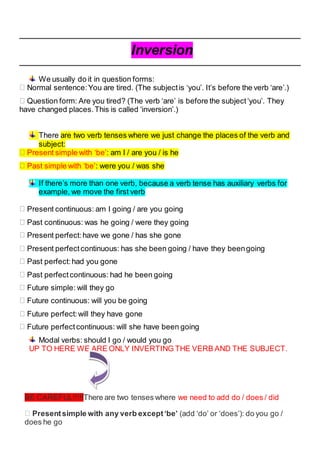
Inversion in english full explanation
- 1. Inversion We usually do it in question forms: Normal sentence:You are tired. (The subjectis ‘you’. It’s before the verb ‘are’.) Question form: Are you tired? (The verb ‘are’ is before the subject‘you’. They have changed places.This is called ‘inversion’.) There are two verb tenses where we just change the places of the verb and subject: Present simple with ‘be’: am I / are you / is he Past simple with ‘be’: were you / was she If there’s more than one verb, because a verb tense has auxiliary verbs for example, we move the first verb Present continuous: am I going / are you going Past continuous: was he going / were they going Present perfect:have we gone / has she gone Present perfectcontinuous: has she been going / have they beengoing Past perfect:had you gone Past perfectcontinuous: had he been going Future simple: will they go Future continuous: will you be going Future perfect:will they have gone Future perfectcontinuous: will she have been going Modal verbs: should I go / would you go UP TO HERE WE ARE ONLY INVERTING THE VERB AND THE SUBJECT. BE CAREFUL!!!!!There are two tenses where we need to add do / does / did Presentsimple with any verb except‘be’ (add ‘do’ or ‘does’): do you go / does he go
- 2. Past simple with any verb except‘be’ (add ‘did’): did we go / did they go When do we use inversion? Of course,we use inversion in questions. We also sometimes use inversion in other cases,when we are not making a question, generally for EMPHASIS.It makes a sentence sound UNUSUAL and QUITE FORMAL. 1: When we use a negative adverbor adverb phrase at the beginningof the sentence. Seldom have I seensuch beautiful work. (‘Seldom’is at the beginning, so we use inversion. This sentence emphasizes what beautiful work it is.) beautiful work. (‘Seldom’is in the normal place, so we don’t use inversion. This is a normal sentence with no special emphasis.) Here are some negative adverbs and adverb phrases that we often use with inversion: Hardly/Scarcely/ Barely: Hardly had I got into bed when the telephone rang. Never/ Never Before Never had she seen such a beautiful sight before. At no time (=Never) should you go out without asking me first. Seldom Seldom do we see such an amazing display of dance. Rarely Rarely will you hear such beautiful music. Hardly ever Hardly ever do I sing in a karaoke. Only then Only then did I understand why the tragedy had happened. Only later Only later did she really think about the situation. Only now Only now do I understand you. Only once Only once did I go to York. Not only … but Not only does he love chocolate and sweets but he also smokes. Not often Not often do I go to the gym. Not always Not always do I know the answer.
- 3. Not once Not once did she refuse to call him. No sooner No sooner had we arrived home than the police rang the doorbell. Nowhere Nowhere have I ever had such bad service. Nothing Nothing have I seen that could make me change my point of view about the issue. Little Little did he know! Only in this way Only in this way could John earn enough money to survive. In no way In no way do I agree with what you’re saying. On no account On no account should you do anything without asking me first. Under no circumstances should you do anything without asking me first. On no condition should you do anything without asking me first. 2. In the following expressions,the inversion comes in the second partof the sentence: Not until Not until I saw John with my own eyes did I really believe he was safe. Not since Not since Lucy left college had she had such a wonderful time. Not before Not before looking at it closely did I know what it was Only after Only after I’d seen her flat did I understand why she wanted to live there. Only when Only when we’d all arrived home did I feel calm. Only by Only by working extremely hard could we afford to eat. Only if Only if you study hard can you pass the exam. 3: With “should”, “were”and “had “ instead of “if” in conditional sentences. This is quite formal: : If I were you, I would talk to him right now. happened. with inversion: Were I you, I would talk to him right now.
- 4. Should you need more information, please do not hesitate to contact me. 4. We can use inversion if we put an adverbialexpression of place at the beginningon the sentence.This is also quite formalor literary: On the table was all the money we had lost. (Normal sentence:All the money we had lost was on the table.) Round the corner came the knights. (Normal sentence:The knights came round the corner.) 5: We can use inversion with ‘so + adjective+ INVERSION+ that’: So beautiful was the girl that nobodycould talk of anything else. (Normal sentence:the girl was so beautiful that nobodycould talk of anything else.) So delicious was the food that we ate every last bite. (Normal sentence:the food was so delicious that we ate every last bite.) 6. After exclamationswith “here”and “there”. Here comes the winner! There goes all our money!